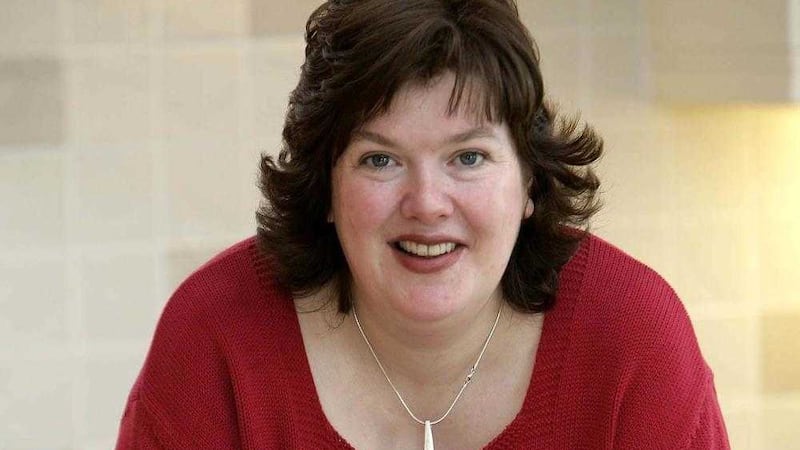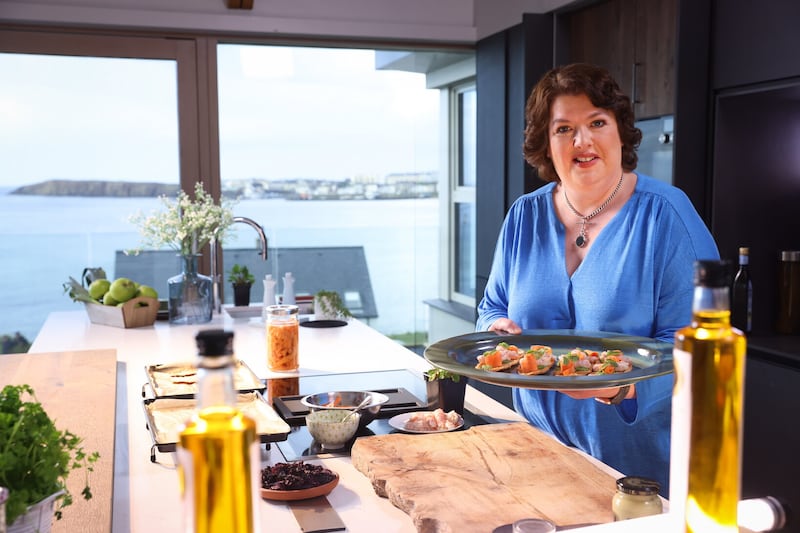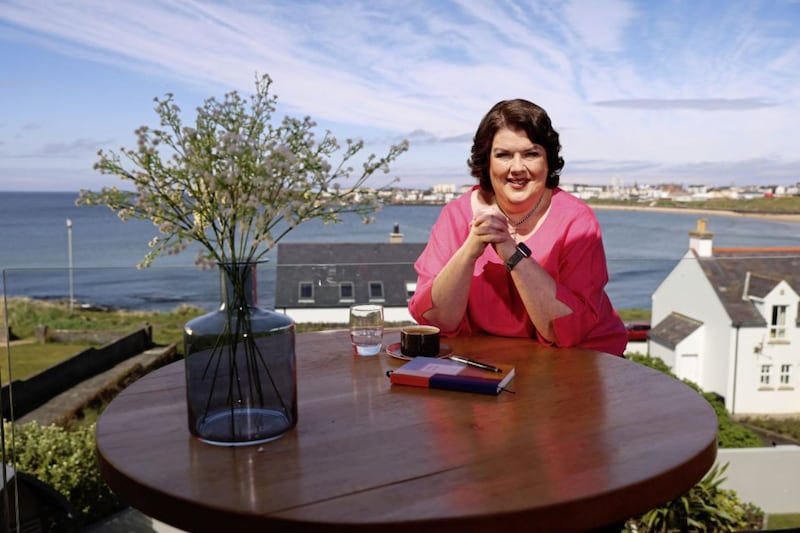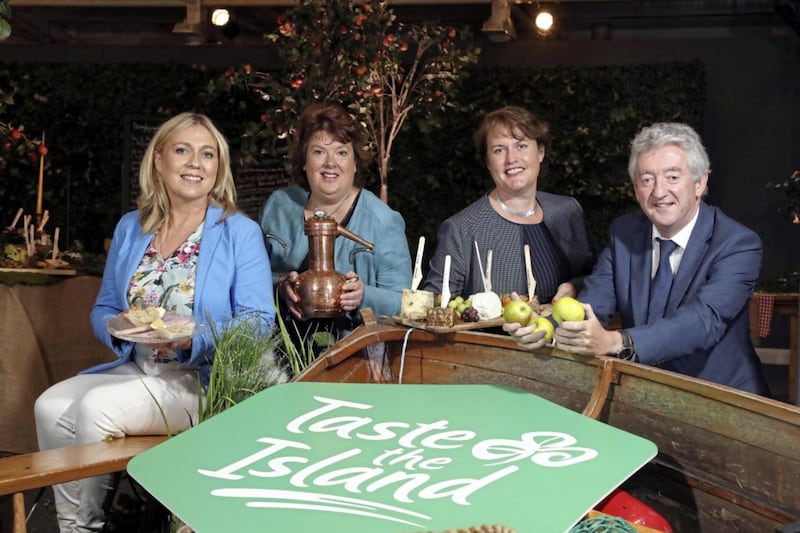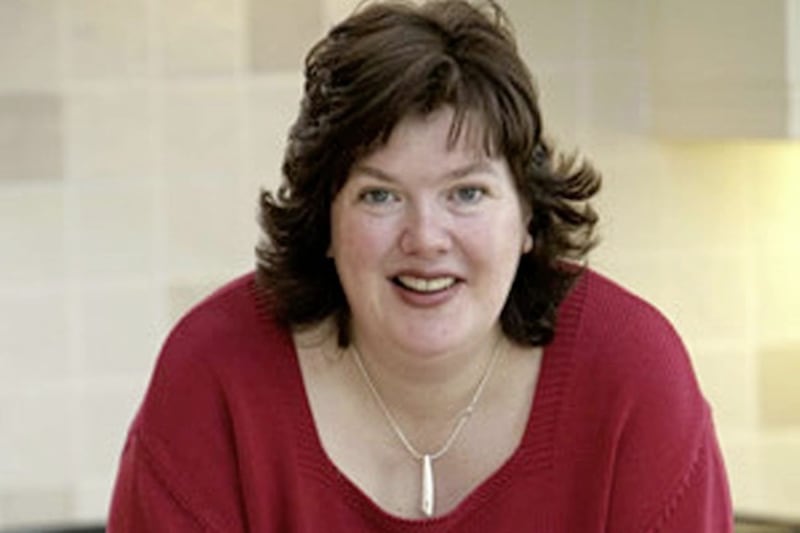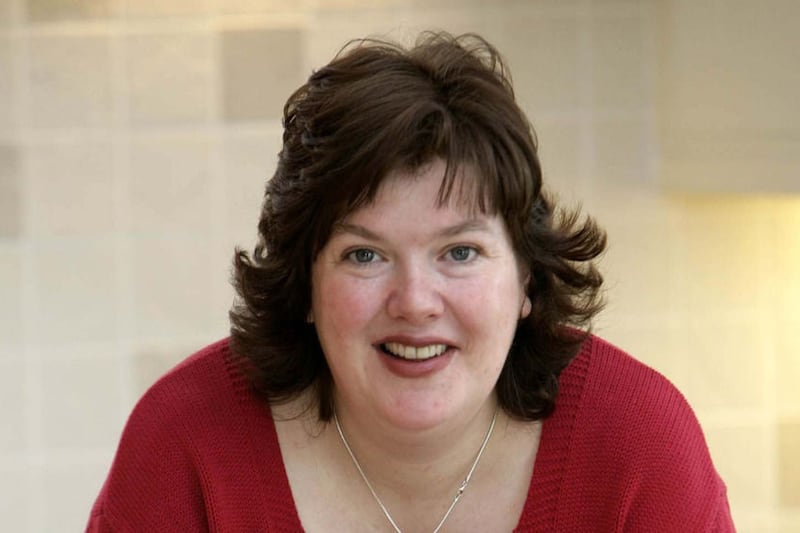IT'S not hard to understand the appeal of Paula McIntyre's new Down To Earth Cookbook – the publication is packed with tasty, easy to assemble dishes made with locally available ingredients.
The back-cover blurb proclaims it to be "a celebration of what we do best in Northern Ireland – our incredible breads and fish, world class meats, beautiful local fruit and vegetables and excellent dairy."
As Paula herself puts it, her latest collection is "a celebration of Ulster food, with simple recipes dedicated to our culinary legacy."
"I had a book out a few years ago (A Kitchen Year) and, while it's still something I'm very proud of, the recipes might have been a bit complicated," admits the culinary expert from Co Derry, a regular contributor to BBC Radio Ulster's Saturday Magazine show.
"A lot of people said to me that they loved the book but that they wouldn't really cook anything from it. So I decided that if I ever did another one, I would love to do a book that was more user-friendly.
"I also wanted to go back a wee bit to recipes that people did years ago, using cheaper 'old fashioned' cuts of meat like the collar of bacon, vegetables like turnip, leeks, scallions and even good carrots.
"I think that's maybe something we have forgotten, because these days it's easy for people to get obsessed with 'exotic' ingredients."
Indeed, the Northern Ireland-sourced produce employed throughout is in keeping with Paula's role as the director of Slow Food Northern Ireland, the local arm of a global grassroots movement devoted to the promotion of high quality local ingredients and the preservation of colloquial culinary traditions.
"The whole Slow Food ethos is about getting back to how our grandparents produced food," enthuses the 48-year-old Portstewart-based chef, who spoke to me while en route to one of her popular live cookery demonstrations.
"They grew vegetables and the fertiliser was horse manure, not anything made by Monsanto, and they grew flowers beside the vegetables, which would have taken care of pest control.
"We have a lot of great gowers here in Northern Ireland who are growing biodynamically. I go to Frank McCook at Slemish Market Garden in Ballymena and he's always got these great stories about growing at the different stages of the moon, when the vibration of the soil will help the seeds.
"So it's about getting back to basics and natural ways of doing food-related things."
The importance of family and friends in the act and enjoyment of cooking is also to the fore throughout the handsomely presented collection, which covers everything from meat, poultry and fish to fruit, veg, breads, desserts and even preserves.
The book is dedicated to Paula's parents ("to my dad, Davy, who says he taught me everything he knows about cooking and to my mum, Rae, who actually did") and she has penned an introductory note for every recipe in which she shares the 'origin story' of the dish at hand.
Creations sourced from and influenced by her nearest and dearest can be found throughout: from a pot roast cabbage based on an original creation by her lifelong friend Nora and a Blackcurrant Barbados cream inspired by book/supper club pal Linda to Aunt Doreen's Chinese chews and Aunt Emily's Raspberry Jelly.
The cover features a truly mouthwatering blackberry and pear crumble, the almond-based topping for which is the creation of Paula's teenage niece Rachel – "a talented, natural baker."
"There's a lot of recipes in the book that I would cook a lot because they're in the family," confirms the Aghadowey-born chef.
"My Aunt Doreen gives me a new recipe almost every time I go to her house. The last one was these wee biscuits that were like a shortcake with Rice Crispies folded in. They were light as a feather and the Rice Crispies had nearly caramelised.
"There's quite a few recipes that I've picked up from people and then tweaked a wee bit as well as a few of my own favourites that I always like to do.
"You should always have a good stew recipe: mine has horseradish and beetroot and the meat is marinated in red wine."
Paula, who established her own restaurant in Manchester during the 1990s before returning home to take charge of the kitchens at several top-rated local eateries, stresses the importance of knowing the provenance of the meat she cooks with.
She is quick to admit her fondness for slow-cooked cheaper cuts like collar of bacon, chump steak and shoulder of lamb – all sourced from a local butcher.
"We've always been blessed with really good butchers in this country," Paula advises.
"The longer the supermarkets are there, the more you sort of realise that you actually want to go a local butchers, greengrocers and or market, where you can talk to the people who actually produced what you're buying and hear the story behind it.
"Complete traceability is a big thing at the moment and if you got to a good butcher they can actually tell you what field the animal came from."
Paula currently leads a weekly class on the Professional Cookery course at Northwest Regional College, where she used to teach full-time in the evenings.
"This year's class are exceptional," she enthuses of her current NVQ Level 3 pupils.
"When you have a good group of young people like them, you can be as inspired by them as anyone. A few of them are really creative and have great ideas, which is lovely.
"We actually have a chef shortage at the moment, but I know I have a full class here who will be very employable in the future."
With Paula keen that her latest publication should be "used, smudged, ripped and spilt over at every availability that involves food, family and friends," no doubt its recipes will inspire budding chefs of all ages to keep the tradition of simple, down-to-earth cooking alive for years to come. In the meantime, why not try these recipes from her book?
:: Paula McIntyre's Down To Earth Cookbook is available now, published by Colourpoint.
DAUBE OF BEEF WITH BEETROOT AND HORSERADISH
1kg stewing steak, cut into 5cm cubes
300ml red wine
2 carrots, peeled and chopped into 2cm dice
1 stick celery, chopped
2 onions, peeled and chopped
Few sprigs fresh thyme
2 cloves garlic, peeled and crushed
4 medium beetroots
1 teaspoon fennel seeds
Zest of 1 orange
Few grinds of black pepper
1 teaspoon salt
100g chopped streaky smoked bacon
1 tablespoon plain flour
1 tablespoon tomato puree
250ml beef stock
1 tablespoon horseradish sauce
Place the steak in a bowl and add the wine, carrots, celery, onions, thyme and garlic. Mix well, cover with cling film and place in fridge overnight.
Set the oven to 170C. Drain the meat and keep the marinating liquor. Remove the meat from the vegetables and pat dry. Heat a tablespoon of the remaining oil in a pan until smoking hot and add half the meat. Cook until sealed all over and transfer to a casserole dish. Repeat with the remaining beef.
Add the bacon to the pan and cook until crisp. Remove from pan and add the reserved veg. Cook for about 5 mins or until the onions are golden. Add the flour and tomato puree and mix well. Add the reserved marinade and beef stock and stir until the sauce starts to thicken.
Add to the meat in the casserole, mix it up and then add a lid. Place in the oven for about 2 hours or until fork tender. Meanwhile, take a sheet of foil and brush with some oil.
Cut the beetroots in quarters and place on the foil. Sprinkle over the fennel seeds, orange zest, black pepper, 2 tablespoons of oil and the salt. Wrap up the foil in a loose parcel and bake for about an hour until the beets are soft. Peel the skin, trim them and cut each quarter into 3 and set aside. When the meat is tender, add the horseradish and cooked beetroot. Cook for another 10 mins. Check seasoning and serve with mash.
DOLLAGHAN OR BROWN TROUT ALMONDINE
2 trout fillets
1 tablespoon local rapeseed oil
1 shallot, peeled and finely chopped
50g butter
Zest and juice of 1 lemon
Handful chopped parsley
1 tablespoon elderberry capers, substitute with regular capers, chopped, or omit
25g toasted flaked almonds
Heat the oil in a non-stick pan until very hot. Season the fillets with salt and place in the pan. Seal off for 30 secs, lower the heat and add half the butter and the shallot. Cook until the shallots are golden (approx 2 mins) then flip the fish over.
Add the lemon juice and zest, elderberry capers and parsley. Add the remaining butter and check the seasoning. Cook through and then transfer to plates to serve. Spoon over all the juices and top with the toasted almonds. It's lovely with new potatoes.
AUNT DOREEN'S CHINESE CHEWS
Ingredients
100g soft butter
100 g light brown sugar
2 eggs
50g self-raising flour
150g chopped dates
1 teaspoon choped preserved ginger
1/2 teaspoon ground cinnamon
75g chopped mixed nuts
Set the oven to 180C. Grease a Swiss roll tin and line with parchment paper. Cream the butter and sugar until pale and fluffy. Add the eggs one at a time. Mix in the flour, followed by the remaining ingredients. Spread into the lined tin.
Bake for 30 mins or until spongey on top and golden brown. Remove from the oven, sprinkle with castor sugar and cut into squares.
